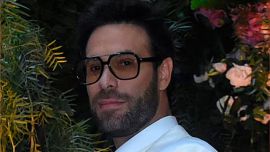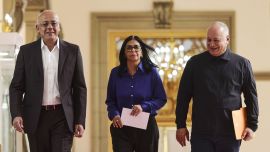Over the years Bloomsday (June 16, the 24 hours into which James Joyce chose to squeeze his universal and eternal insights into the single location of the Dublin of 1904 in his masterpiece Ulysses) has taken the form in Buenos Aires of tiny groups of devotees sporadically gathering to read out select chapters while munching the fried kidneys of Leopold Bloom’s breakfast but this year was a much grander event – the film 100 years of Ulysses was screened at the Jorge Luis Borges Auditorium of the National Library, drawing a couple of hundred Joyce fans despite falling on the cusp of a long weekend.
Made last year to mark the centenary of Sylvia Beach’s daring publication of the controversial masterpiece in Paris on February 2, 1922 (Joyce’s 40th birthday present to himself, as this film reveals), the documentary reached Argentina too late for the 100th Bloomsday but no matter – the book is timeless. Quite apart from the fact that it was not the 100th Bloomsday in any case – as this film also reveals, this festivity first started in 1954, half a century after publication, due to the intensely polemical nature of this modernist novel.
Why so controversial? Joyce’s notorious differences with Ireland’s then-dominant Catholic Church are perhaps better known than his rejection of Irish nationalism making him a stranger in his own land – a book mocking Gaelic-drenched patriotism as a one-eyed Cyclops published just two months after the triumphant creation of an Irish Free State. Not helped either by Joyce only returning a couple of times to his native land in the last 37 years of his life and rejecting an Irish passport. His main objection to Irish nationalism was that it created an inward-looking culture instead of looking out to the Europe where Joyce spent those 37 years. For that reason, the film underlines, Joyce would rejoice over Ireland’s entry into and strong adherence to the European Union today.
Yet this documentary is also very good at explaining how Joyce’s rejection of nationalism made him more rather than less Irish – Rudyard Kipling’s “What know they of England who only England know?” also crosses the Irish Sea. Ulysses is so universal that it could have unfolded anywhere but it is set in Dublin with a meticulous knowledge of the Irish capital (the result of intense consultation of siblings rather than spontaneous, the film reveals). Ireland was Joyce’s Hotel California – you can check out any time you like but you can never leave.
The film is also graphic in expanding on Joyce’s hostility to the Church to a degree which might not have been conceivable in the past century (and which perhaps does not convey the writer’s own sometimes ambivalent attitudes). Joyce felt very strongly that those who do not believe in God have the obligation to create, everybody else can leave it to the Creator.
The documentary is basically a filmed narrative of Joyce’s life (1882-1941) which does not omit his contributions to world literature, especially his “stream of consciousness” techniques. It recounts an uneven middle-class upbringing with a drunken father, a Jesuit schooling at Clongowes and Belvedere, University College Dublin studies and the European years – Trieste from 1904 until the outbreak of war between Italy and Austria-Hungary in 1915 and the last two decades of his life in Paris (1920-1940) with Zurich at either end due to world war. The film also underlines how central the 1904 year of Bloomsday was in Joyce’s life – both the year of his mother’s death at the age of 42 and his meeting with his lifelong love Nora Barnacle, as well as turning his back on Ireland.
The presentation of the film was preceded by introductions by National Library Cultural Coordinator Guillermo David and Irish Ambassador Gerard McCoy with a reception (no kidneys!) afterwards. Last but not least, a comment from the writer after whom the auditorium was named (and who had denial of a Nobel Prize in common with his Irish colleague) – Borges combined intense admiration of Joyce with an open admission that he had never read Ulysses because “I didn’t need to because I always knew what it was about.”






















Comments